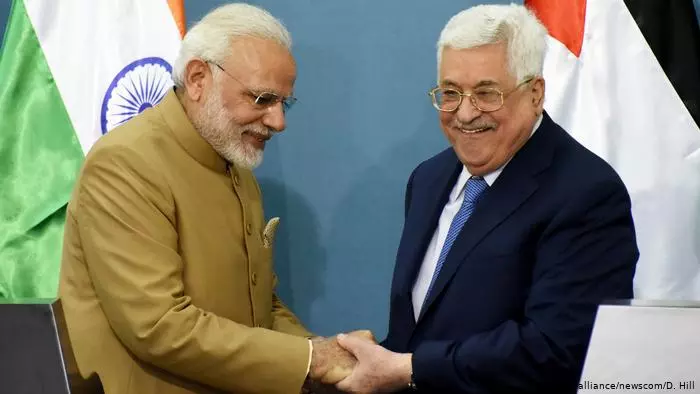
India's stance on Palestine situation
text_fieldsPrime Minister Narendra Modi and Palestine Authority President Mahmoud Abbas (file photo)
The Israeli military's attacks on Gaza and East Jerusalem,which are integral parts of Palestine, is entering the second week, unleashing terrible destruction. While the UN watches helplessly without even demanding a ceasefire, India's stance on it as a country which had recognized Palestine since the beginning and established diplomatic relations with them, is under debate. The Israeli army's missiles and bombs raining down on civilians and institutions in Gaza day and night have made life in the region extremely unbearable. Women and children are stranded with no electricity, water or other basic amenities. The number of women and children in the 200 citizens killed so far is shocking. It is saddening that not even light is available in the few hospitals available to admit over 1000 injured. It is in these circumstances that protests have emerged against Israel's inhumane atrocities from all corners of the world; that there is a need for the world community to act immediately to stop the attack. The UN Security Council meeting on Sunday was marred by US objections. Other permanent members, including Russia and China, exercised restraint, knowing that the US would veto any decision unpalatable to it. However, the position taken by India in this regard, though only as a non-permanent member, is very important for the country.
In 1948, when the United Nations decided to establish the world's first Jewish state on Palestinian soil, India too supported it. While other Arab countries fought the UN decision tooth and nail, India joined the veto powers. However, the Jewish state was then only one-third of Palestine. Gandhi took a firm position that the land rightfully belonging to the Arab people should not be seized to form the Jewish state. Not only has India not changed this stance since then, but it has also recognised the state of Palestine and granted it an embassy in New Delhi. India has also officially hosted the PLO's Yasser Arafat's visits to the country multiple times. When full diplomatic relations with Israel was established under PV Narasimha Rao's government, Palestine's status was not lowered or changed. Prime Minister Manmohan Singh in 2013 and President Pranab Mukherjee in 2015 publicly endorsed the sovereign independent state of Palestine with East Jerusalem as its capital.
However, when Palestine Authority President Mahmoud Abbas visited India in 2017, Prime Minister Narendra Modi said, "We hope for early realisation of a sovereign, independent, united and viable Palestine, co-existing peacefully with Israel." Modi deliberately avoided mentioning East Jerusalem as its capital. It is clear that this change of stance should have been music to the ears of Israel. At the last UN Security Council meeting on Sunday, India's envoy, TS Tirumurti said " We urge both sides to show extreme restraint, desist from actions that exacerbate tensions, and refrain from attempts to unilaterally change the existing status-quo, including in East Jerusalem and its neighbourhood". He also expressed concern over the attacks on Haram Al-Sharif during Ramadan and the possible eviction moves in the Sheikh Jarrah neighbourhood.
This change in stance can be easily understood in the backdrop of the strong military, economic and technology-related ties India now maintains with Israel. Even then, when Netanyahu tweeted his gratitude to the countries showing their flags, they did not include India's. This is indicative that the Zionist state could not take India's tacit support at face value. Nor is it satisfied with anything short of a stance that completely denies the existence of Palestine. Since that list currently includes countries from America to Albania, the thing to watch is which Arab countries will find their place in future in that array. But if truth, justice and humanity have any place and consideration, our people and government must be able to openly oppose, at least in words, the brutal Israeli occupation.






















